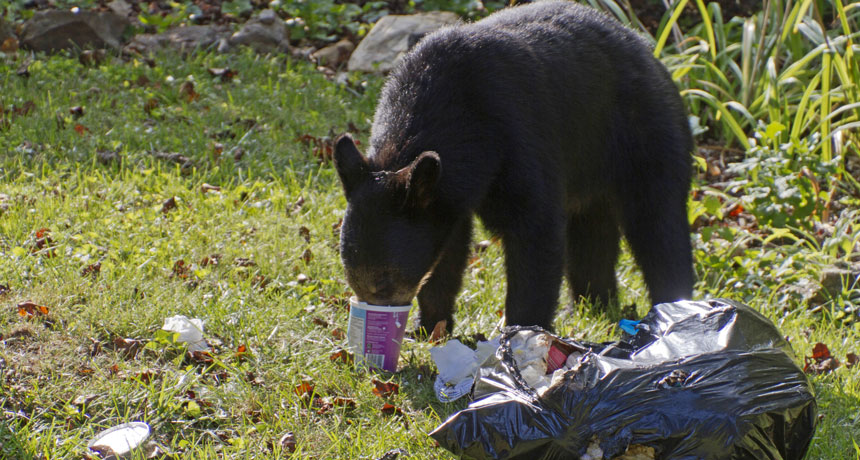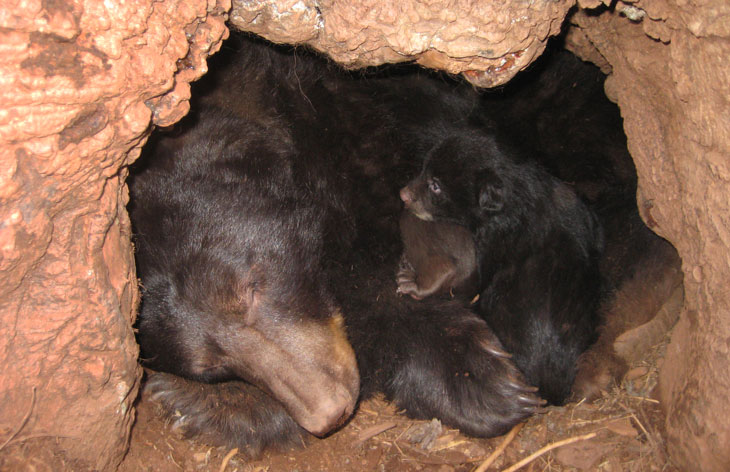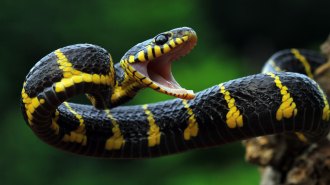
BEAR BINGE The more a black bear snacks like a human, the more likely that bear is to skimp on hibernation, a new study says. And shorter hibernation might accelerate aging at the cellular level.
J. Bicking/Shutterstock
Mama bears may need to raise their snouts and join the chorus protesting junk food.
The more sugary, highly processed foods that 30 female black bears scrounged from humans, the less time the bears were likely to spend hibernating, researchers found. In turn, bears that hibernated less tended to score worse on a test for aging at the cellular level, wildlife ecologist Rebecca Kirby and her colleagues conclude February 21 in Scientific Reports.
The new research grew out of an earlier project to see what wild black bears across Colorado were eating, says study coauthor Jonathan Pauli, a community ecologist at the University of Wisconsin–Madison. Kirby, his Ph.D. student at the time, checked diets from hundreds of bears across the state. Hunters there are not allowed to set out bear bait, such as heaps of doughnuts or candy, so the animals’ exposure to human food comes mostly from scavenging.
When bears eat more processed foods, their tissue picks up higher concentrations of a stable form of carbon called carbon-13. That extra carbon comes from plants such as corn and cane sugar. (These crop plants concentrate the atmosphere’s normally sparse amounts of carbon-13 as they build sugar molecules in steps somewhat different from those in most of North America’s wild plants.)
Looking for the telltale forms of carbon in that earlier study, the researchers found bears in some places scavenging “really high” proportions of people’s leftovers. On occasion, these leftovers made up more than 30 percent of bears’ diets, Pauli says.
In the new study, Kirby looked at the impact of diet on hibernation. Bears typically slumber four to six months, during which female bears give birth. Kirby and her colleagues focused on 30 free-roaming females around Durango that were monitored by Colorado’s Parks and Wildlife department. The team first tested bears for carbon-13, and determined that the ones that ate more human-related foods tended to hibernate for shorter periods of time.

Studies in smaller hibernating mammals hint that these seasonal metabolic slowdowns might delay the ravages of aging. If that’s true, shortening hibernation bouts might have a downside for the bears.
To measure aging, the researchers tested for relative changes in length of what are called telomeres. These repetitive bits of DNA form the ends of chromosomes in complex cells. As cells divide over time, telomere bits fail to get copied and telomeres gradually shorten. Various researchers propose that tracking this shortening can reveal how quickly a creature is aging. Among bears in the study, those that hibernated for shorter periods had telomeres that shortened more quickly than those of other bears, suggesting the animals were aging faster, the team found.
Free-ranging bears didn’t always cooperate with Kirby’s needs for several kinds of data, so she does not claim to have made one direct and “definitive” link between bears eating more human food and shortening telomeres as a sign of aging. So far, Kirby, now with the U.S. Fish and Wildlife Service in Sacramento, Calif., calls the evidence “suggestive.”
Using additional methods to measure telomeres could help clarify what is going on at the cellular level, says telomere researcher Jerry Shay of the University of Texas Southwestern Medical Center in Dallas. Still, he muses, the idea of connecting more human food, truncated bear hibernation and faster cell aging “may be correct.”







